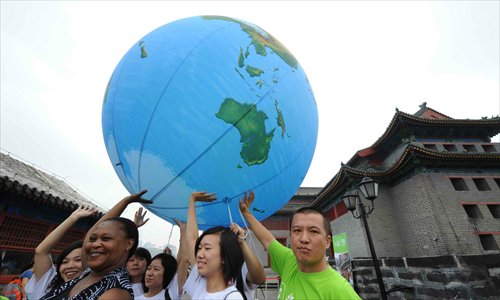HOME >> CHINA
Chinese NGOs bound for Paris
By Kou Jie Source:Global Times Published: 2015-11-23 19:33:01
Play key role in facing climate change challenges

Representatives of NGOs, students and embassies of developing countries in Beijing hold a model of the Earth, calling on joint efforts to fight against climate change. Photo: CFP
Chinese nongovernmental organizations (NGOs) have been invited to a critical conference on climate change in Paris, representing hundreds of NGOs across the nation.
In China, NGOs play a critical role gathering scientific data used by policymakers, supervising the enforcement of regulations at a local level, and serving as a bridge between the people, the government and entrepreneurs.
However, the NGOs still face challenges, particularly because many lack expertise.
Raising awareness
The 21st Conference of the Parties to the United Nations Framework Convention on Climate Change (COP21) will be held in France from November 30 to December 11, attracting participants from more than 195 countries, including 2,000 NGOs.
"We will send 21 members to take part in the conference," Zhan Yufeng, director of China Youth Climate Action Network (CYCAN), told the Global Times.
His group mainly focuses on raising awareness of climate change and the importance of transitioning to sustainable energy. It's held an annual youth summit in Shenzhen since 2009.
Entrepreneurs in China have formed NGOs to have their voices heard on climate change issues. In 2004, the Society of Entrepreneurs and Ecology (SEE) was founded by 80 initial members, most of whom are influential Chinese entrepreneurs such as investment bankers, mine owners and Internet CEOs.
Setting the standards
Wang Gengchen, a research fellow from the Institute of Atmospheric Physics at the Chinese Academy of Science, told the Global Times that some NGOs work on collecting data and doing research, offering valuable suggestions to China's policymakers.
For example, the China Business Council for Sustainable Development (CBCSD) has launched its Energy Conservation and Climate Change project and released many guidelines regarding greenhouse gas emission, such as The Calculation Method of CO2 Emission in Petrochemical Production (SH/T5000-2011), which was recognized by China's National Development and Reform Commission (NDRC).
According to Ji Qing, director of the secretariat of the CBCSD, the organization has been cooperating with research institutes, enterprises and experts to develop guidelines on greenhouse gas emission since 2008. The NDRC has also used their reports for reference and released the official Guideline of the Greenhouse Gas Emission Accounting and Reporting for the Petrochemical Production Enterprise in 2014, which was released by the State Committee of Standardization as a national standard on November 19.
Wang Gengchen also noted that NGOs can supervise the government and enterprises, reminding them of the negative consequences of climate change.
"China's policies might be great, but local government sometimes would choose higher GDP over fighting climate change. NGOs can act like an impartial supervisor and improve the implementation of the policies," Li Yan, deputy program director of Greenpeace East Asia, told the Global Times. Recently, an NGO for the first time successfully sued a polluter violating government regulations.
Challenges
Despite all the achievements, Chinese NGOs are still facing many challenges.
According to a Beijing-based NGO staff member who asked to remain anonymous, there are many NGOs working on the climate change, but few are professional. The lack of experts and precision equipment makes their reports less scientifically reliable.
"Admittedly, Chinese NGOs have a limited influence on policy making or political discussion related to climate change, mainly because they lack professional ability," Chen Jiliang, a researcher from Beijing-based Greenovation Hub, told the Global Times.
According to Chen, NGOs in China may find it difficult to carry out their plans if they don't have a good relationship with local government. The situation would be even worse if conflicts between the local government and NGOs arise.
Wang Gengcheng summed up the situation by saying the government takes the leadership role in dealing with climate change, while individuals and enterprises play important roles in pollution. NGOs are the bridges connecting them.
Posted in: Environment